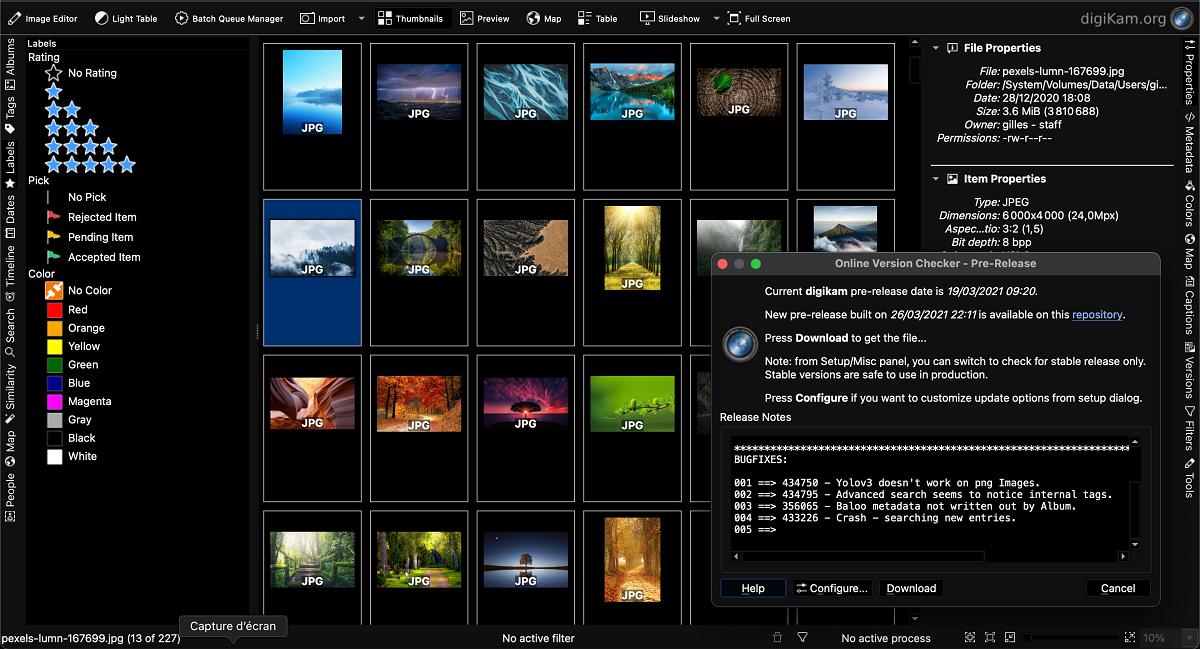
After a year of development the release of the new version was announced of the program for managing the photo collection digikam 7.2.0 and this new version arrives solving about 360 errors and with numerous improvements, of which the face detection engine stands out, as well as the album, the update search tool and more.
For those who are unaware of digiKam should know that this is a free image organizer and tag editor and open source written in C ++ using KDE applications.
It runs on most popular desktop environments and window managers, provided the necessary libraries are installed.
Supports all major image file formats, such as JPEG and PNG, as well as more than 200 raw image formats, and you can organize photo collections in directory-based albums or dynamic albums by date, timeline, or tag.
DigiKam 7.2.0 Key New Features
In this new version face detection engine and red-eye removal tool use new machine learning model (Yolo) to better define faces in images with complex angles.
Data processing speed has also been increased and the possibility of parallelizing operations has been implemented, they were removed from the base distribution files with data from the machine learning model, which are now loaded at runtime and the graphical interface has been redesigned to work with faces and link tags to them, as well as related widgets.
Another change that stands out is that the photo album management process has been improvedinformation grouping capabilities have been expanded, the mask output filtering engine has been sped up, the display of properties has been optimized, and support for removable media has been improved.
The internal engine for processing RAW images has been updated to version libraw 0.21.0. Added support for CR3, RAF, and DNG formats, plus added support for new camera models, including iPhone 12 Max / Max Pro, Canon EOS R5, EOS R6, EOS 850D, EOS-1D X Mark III, FujiFilm X -S10, Nikon Z 5, Z 6 II, Z 7 II, Olympus E -M10 Mark IV, Sony ILCE-7C (A7C) and ILCE-7SM3 (A7S III).
Of the other changes that stand out:
- Improved tool for importing photos from cameras, added support for automatic naming to albums and renaming during upload.
- A utility has been added to check for updates to binary assemblies with the ability to download and install them automatically.
- Builds for macOS have been significantly improved.
The code has been optimized to work with the database and the storage schemes used for search, metadata storage, facial recognition and operation of various tools. Improved collection scan speed during startup. - Improved support for integration with the semantic search engine and with MySQL / MariaDB.
- The tools for database maintenance have been expanded.
Work has been done to improve the stability and usability of the tool to rename a group of files in batch mode.
The ability to save location information to metadata has been added and support for GPX files has been improved.
Finally, if you are interested in knowing more about it about the new version released you can check the details In the following link.
How to install digiKam 7.2.0 on Ubuntu and derivatives?
For those interested in being able to install this new version of digiKam 7.2.0 on your system They will be able to do it quite simply.
For this we are only going to download its installer using some of the commands that we share with you below What we are going to do is open a terminal and type:
wget https://download.kde.org/stable/digikam/7.2.0/digiKam-7.2.0-x86-64.appimage -O digikam.appimage
We give execution permissions with:
sudo chmod +x digikam.appimage
And they can run the installer by double clicking or from the terminal with:
./digikam.appimage